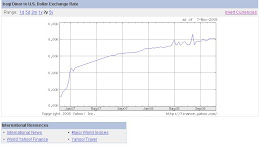In an interview, Iraq's central bank's chief economist said that Iraq is committed to phasing out subsidies built-up over decades as the oil-based economy became more centralized.
Discontent over high unemployment and low standards of living and tensions between the majority Shiite and minority Sunni sects have already raised concerns that daily attacks may turn into civil war. Iraq has agreed to restructure the subsidies system, not scrap it altogether, in meetings with donors and creditors, the economist said.
He was speaking after a conference organized by the United States and the European Union to discuss ways to stabilize Iraq and activate billions of dollars of international aid promised two years ago. More than 95 percent of the $15 billion non-American aide pledged, mainly from Japan and Europe, had not been committed because the level of violence had prevented work being done. Disagreements between donors and slow economic reforms in Iraq making project management difficult had also stemmed the aide flow.
Iraq expanded handouts and subsidies to help people cope with crushing sanctions imposed by the United Nations from 1990-2003, which contributed to the economic collapse of the country with the world's second largest world reserves. This came on top of $120 billion of debt mostly accumulated in the 1980s to finance an eight-year war with Iran. (Source)Menafn

